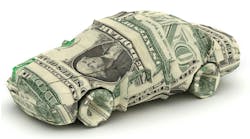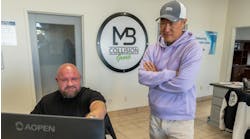"There were three PDR guys servicing this area in 1992, now there are 60," says Tommy Clayton, owner of Tommy's Dent Service in Gibsonville, N.C. "There's been lots of downward pressure on prices caused by low-cost guys and insurance companies that develop contracts with body shops. If a dent tech can't compete on quality, he'll drop his pants on price. The next PDR tech who comes along, whether he is good or not, must compete against that low price. Sometimes he does the same thing and the cycle continues."
Clayton has been making a living as a mobile PDR tech since 1992. Before that, he installed mobile accessories, trim and stripes. "I got into the PDR business with my uncle, who was one of the first in North Carolina to do it," he says. "I went into business on my own in 1998."
He said insurance companies also are cutting PDR tech margins by developing pricing charts that do not take into account the amount of labor involved in repairing certain kinds of dents, as well as the degree of difficulty.
"Insurance companies don't want to pay any more money for dropping the headliner or sunroof, which takes more time" Clayton says. "Some PDR techs are new and they won't argue. The insurance company is not the customer and should not set pricing."Some dents, such as those in roof rails, often must be repaired using a more time-consuming process called glue pulling. That procedure takes longer than repairing a door dent, which is easier to access and can be repaired using traditional tools.
He said companies that sell warranties to repair dents are commoditizing the industry and taking what is potentially more profitable PDR retail work from independents, such as himself, and giving the work to assigned subcontractors at a lower rate. "They agree to do that work at a wholesale price, knocking out a retail price, which puts more downward pressure on pricing," he says.
Despite these pressures, Clayton said during an educational session he presented before the Mobile Tech Expo that talented PDR techs with 10 years of experience can make from $70,000 to $150,000 per year, depending on whether they pursue work in the retail or wholesale markets. While prices vary nationwide, he said most dent repair work in his market starts at about $75 retail, with wholesale prices being lower.
Clayton is a founder and current secretary of the board of directors for the recently established National Alliance of PDR Technicians (NAPDRT), which incorporated in August 2006. The NAPDRT has about 160 members nationwide.
The non-profit organization's mission is to unite independent PDR techs and educate them and consumers on the service and value provided by NAPDRT membership. It also aims to give a voice to independent technicians so that industry issues, which can determine a tech's livelihood, are not decided by a handful of companies claiming to represent the entire industry.
Additional challenges
Other industry challenges involve establishing accounts, new metals used in vehicles and the type of work being offered."The biggest challenge is the size of the dents that we are asked to do," says Terry Siegle, president of Ace Dent Removal in Overland Park, Kan. "They are getting bigger and deeper. Fortunately, the tooling has gotten better. It is stiffer, stronger and more user-friendly."
Siegle said about 70 percent of his work is done from his mobile truck and 30 percent from his store location, since some customers prefer to bring their vehicles in. He has two part-time employees working at his body shop. He said he does mostly retail work, some of which is contracted through body shops.
"It's tough to make money in the wholesale business unless you have eight to 15 dealerships that you work for," he says. "I try to build my retail business through word-of-mouth and the Internet. Every satisfied customer is like 100 extra potential customers."
It can be difficult to establish accounts, both retail and wholesale.
"It is hard getting established with accounts because of all the competition," Siegle says. "Some accounts are tired of trying new guys and will be loyal to one or two guys and wait for them. New people getting started in the business, as long as they get in with the right people, will be OK."
Automakers also are creating challenges for PDR techs.
"Adapting to newer vehicle models and the material thicknesses of metals is the biggest challenge," says Mike Wahl Jr., owner of Dents Etc. in Norwalk, Iowa. "There is a large swing toward using thinner gauge metal and aluminum. You also have to be careful of new components, such as molding. It is much thinner now than in was four years ago."
"You need to know your surroundings before you start to tear things apart to get in a position to push out a dent," Wahl says. "You need to be aware of side air bags, which usually are up in the roof line."
Wahl has been in PDR for 10 years and was in the collision repair industry before that. He studied collision repair in community college while working at a body shop.
"I transitioned from collision repair to PDR because body shops were getting strangled by insurance companies," he says. "I had reached my peak in terms of income, and wanted to get out of the chemical part of using primers and paints. I wanted to work in the fresh air and have my own business where I could get out and meet people. I wanted to be my own boss and set my own hours."
While 95 percent of his business is mobile, he also has a shop where he works by appointment only. In addition to PDR, he does windshield chip repair, lockout service and complete detailing. "I don't advertise the other services but will do them on request," Wahl says.
Most of his work is done in retail for body shops and car club members. He relies primarily on word-of-mouth to grow his retail business. "I sponsor a few events in the community, but I don't see a benefit from that in workflow," he says.
Most PDR techs choose to start in the wholesale business to try to get a lot of work and get their name known in the industry. "You won't make much money in wholesale, but if you have a few good dealers you will have a good volume of vehicles," Wahl says.
Chasing hail
One popular method of earning money in PDR is by "chasing hailstorms." Web sites and subscription fax reports tell techs where hail has hit. Where there is hail, there are dented cars.
"Techs will drive there and locate in a body shop, rent space in a tire shop or put up a tent in the Kmart parking lot," Siegle says. "It's a price-sensitive business and lots of lowballing goes on after hailstorms. Sometimes you get to town and a large company comes in with lots of techs and cuts your price in half. It's nerve-wracking to go there, get set up and established, and hope nobody comes in and lowballs so much that you have to pack up and leave."
Siegle said he doesn't chase hail, but he has industry contacts who sometimes ask him to come and work with them after a hailstorm.
"When an area gets hit by hail, the circus comes to town," says Clayton. "Some guys come into town, set up tents, offer free estimates and cut-rate prices and are gone next week. Some hail chasers do a very good job, but others just take a huge percentage of work and don't care how it looks. They mangle cars, give PDR a bad name and leave town."
Clayton said PDR technicians should be certified by Vale National, a company that trains damage estimators and adjusters. "That's a good starting point, but it does not guarantee good work," he says.
S U P P O R T E D B Y :



